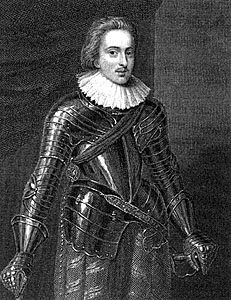 enry V (1387-1422), king of England, son
of Henry IV, whom he succeeded in 1413. The Lollard movement
caused the government anxiety, and Henry continued his father’s
repressive policy. Meanwhile the ravage of privateers from
Normandy made an invasion of France popular. Henry became regent
of France, with the right of succession, and married the French
princess Catherine. For the rest of his life Henry was occupied
in Anglicizing Normandy, and in checking risings in France
against the English predominance. See Kingsford’s Henry
V, and Church’s Henry V (1889). [World Wide
Illustrated Encyclopedia, 1935]
enry V (1387-1422), king of England, son
of Henry IV, whom he succeeded in 1413. The Lollard movement
caused the government anxiety, and Henry continued his father’s
repressive policy. Meanwhile the ravage of privateers from
Normandy made an invasion of France popular. Henry became regent
of France, with the right of succession, and married the French
princess Catherine. For the rest of his life Henry was occupied
in Anglicizing Normandy, and in checking risings in France
against the English predominance. See Kingsford’s Henry
V, and Church’s Henry V (1889). [World Wide
Illustrated Encyclopedia, 1935]
 Notes on King Henry V (ruled
1413-1422)
Notes on King Henry V (ruled
1413-1422)
The eldest son and successor of Henry IV was born at Monmouth in
1387. When he only 16 years old he was in command of the English
forces that defeated the Percys and Neville at the Battle of
Shrewsbury. He helped put down the Welsh revolt, and in 1411 he
led an expedition to France. His father’s long illness
brought him heavy political responsibilities early in life. These
strenuous early years devoted to war and politics contradict the
tradition, immortalized by Shakespeare, that "Prince Hal,"
companion of the fat knight Falstaff, was a riotous madcap. Henry
proved to be a forceful king and great military commander Henry
put forth again the claim to the French throne, formerly raised
by Edward III. He thereby renewed the Hundred Years’ War. By
his brilliant victory at Agincourt in 1415, he conquered all the
northern half of France. Five years later, he married Catherine
of Valois, and it was agreed that he should become King of France
after the death of her father, the insane Charles VI. But Henry
died of camp fever at Bois de Vincennes, France, in August 1422,
leaving as heir to his rights in both kingdoms, his infant son
Henry, who was but nine months old. {Chamber’s Biographical
Dictionary} [GADD.GED]
Henry V (of England) (1387-1422), king of England (1413-22),
known for his victorious campaigns against France, born at
Monmouth in August or September 1387. He was the son and
successor of Henry IV. In 1403 Henry led the royal army that
defeated the rebellious Percy family, led by Sir Henry Percy, at
Shrewsbury. He also commanded the English forces that put down
the revolt of the Welsh chief Owen Glendower. In 1410-11, when
his father was incapacitated by illness, Henry headed the royal
council, but was removed after a political quarrel with his
father. On succeeding to the throne in 1413 Henry V restored Sir
Henry Percy's son to his lands and titles; he also honorably
reburied at Westminster Abbey the remains of Richard II, who had
been deposed by Henry IV and had died in prison during the latter's
reign. The new king continued his father's policy in persecuting
the religious sect known as the Lollards and executed their
leader, Sir John Oldcastle, in 1417.
In 1415 Henry warred against France, winning in that same year
the Battle of Agincourt. The following year he allied himself
with the Holy Roman emperor Sigismund, and in 1417 he began the
conquest of Normandy, completing it with the capture of Rouen two
years later. He concluded a peace treaty with Charles VI of
France at Troyes in 1420, obtaining Charles's daughter, Catherine
of Valois, in marriage and securing the promise of succession to
the French throne on the death of Charles. When Henry returned to
England in 1421, leaving his brother Thomas, duke of Clarence, as
governor of Normandy, the French rose in opposition to English
rule and defeated the duke. Henry returned to France for a third
campaign, but he became ill and died. He was the most influential
ruler in western Europe at the time of his death in Vincennes,
France, August 31, 1422. He was succeeded by his son Henry VI. [Microsoft
Encarta 98 Encyclopedia]
 Back
Back
 enry V (1387-1422), king of England, son
of Henry IV, whom he succeeded in 1413. The Lollard movement
caused the government anxiety, and Henry continued his father’s
repressive policy. Meanwhile the ravage of privateers from
Normandy made an invasion of France popular. Henry became regent
of France, with the right of succession, and married the French
princess Catherine. For the rest of his life Henry was occupied
in Anglicizing Normandy, and in checking risings in France
against the English predominance. See Kingsford’s Henry
V, and Church’s Henry V (1889). [World Wide
Illustrated Encyclopedia, 1935]
enry V (1387-1422), king of England, son
of Henry IV, whom he succeeded in 1413. The Lollard movement
caused the government anxiety, and Henry continued his father’s
repressive policy. Meanwhile the ravage of privateers from
Normandy made an invasion of France popular. Henry became regent
of France, with the right of succession, and married the French
princess Catherine. For the rest of his life Henry was occupied
in Anglicizing Normandy, and in checking risings in France
against the English predominance. See Kingsford’s Henry
V, and Church’s Henry V (1889). [World Wide
Illustrated Encyclopedia, 1935] Notes on King Henry V (ruled
1413-1422)
Notes on King Henry V (ruled
1413-1422)